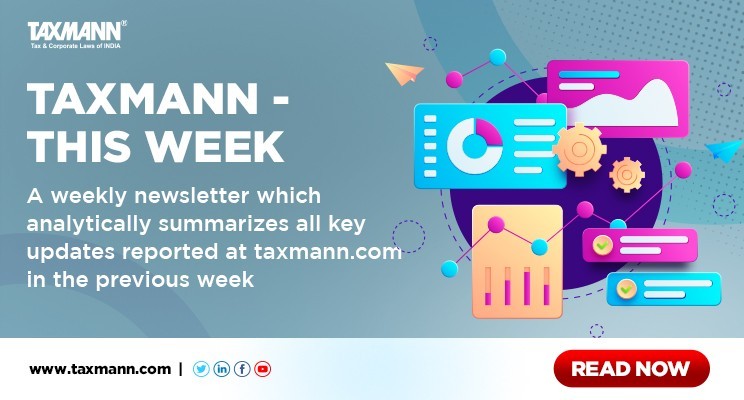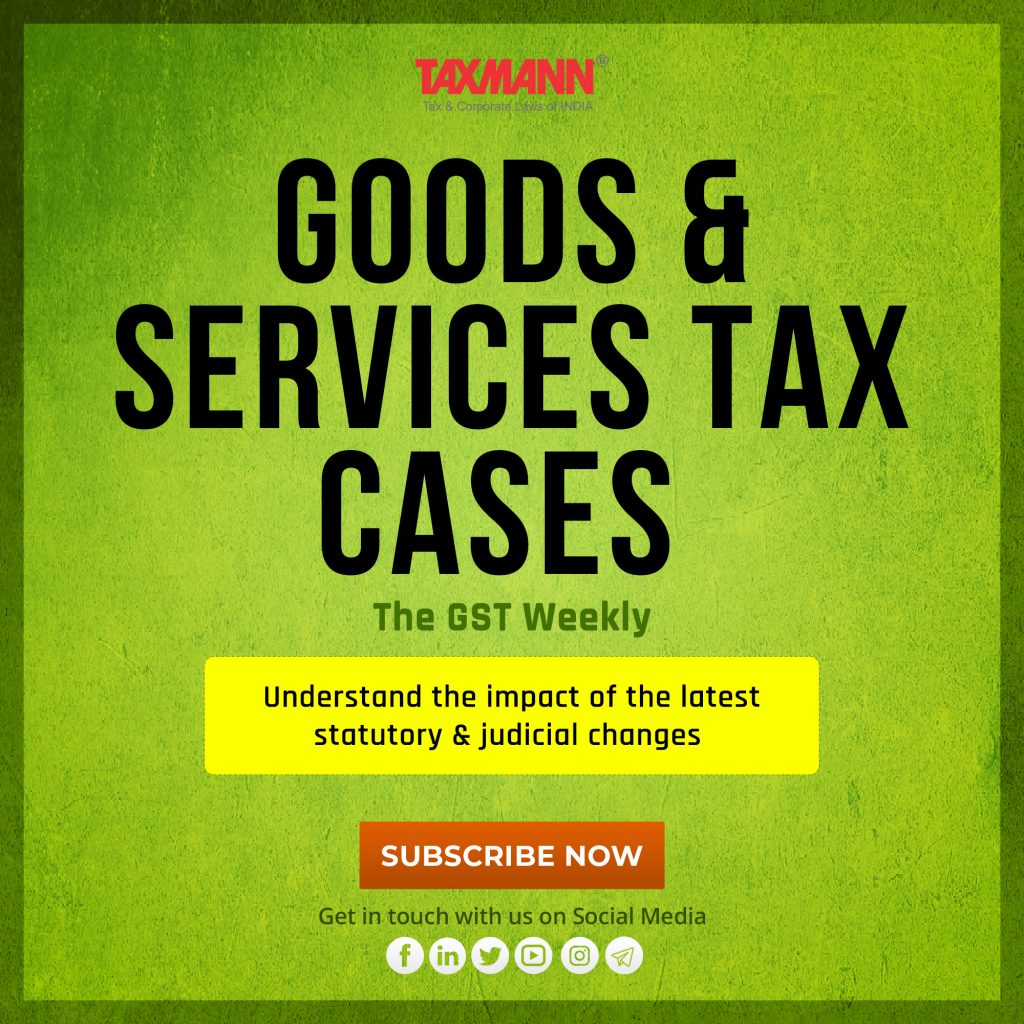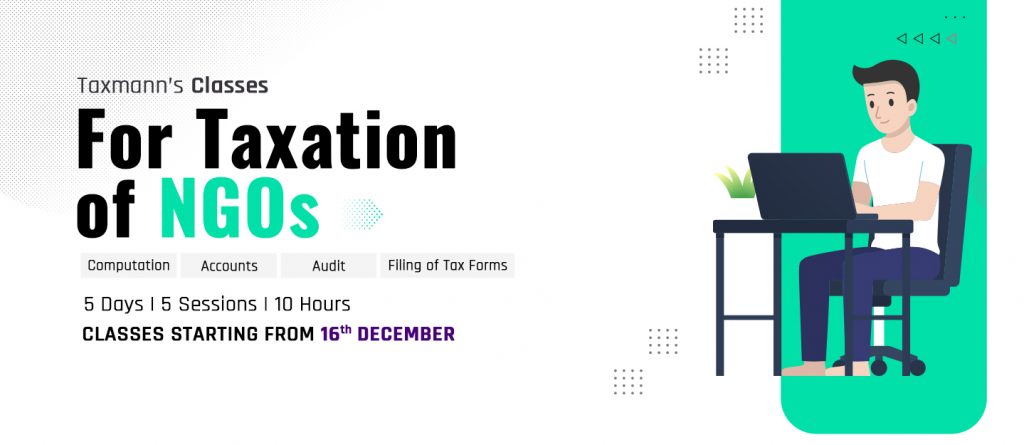Weekly Round-up on Tax and Corporate Laws | 29th to 04th December
- Blog|Weekly Round-up|
- 10 Min Read
- By Taxmann
- |
- Last Updated on 8 December, 2021

This weekly newsletter analytically summarizes the key stories reported at taxmann.com during the previous week from 29th November to 04th December 2021, namely:
(b) All your questions on ITRs answered in ‘FAQs on Income-tax Returns for Assessment Year 2021-22’
(f) Revenue Recognition from sale of electricity as per Ind AS 115
1. Gujarat High Court directed AO to allow TDS credit to an employee even if TDS wasn’t deposited by the employer
The Gujarat High Court has ruled that the Income-tax department is precluded from denying the benefit of the tax deducted at source by the employer during the relevant financial years. The Court held that where tax has been deducted by an employer but not paid to the Central Government, the department should resort to Section 201 to recover TDS with the employer.
Facts
The assessee was a pilot with Kingfisher Airlines (‘employer’). The employer had deducted tax at source (TDS) from the salary income of the assessee for the Assessment Year 2009-10 and 2011-12. However, the said TDS amount had not been deposited by the Airlines in the Central Government Account. Accordingly, the TDS credit as claimed by the assessee was denied by the Assessing Officer (AO). The AO raised demand with interest and initiated recovery proceedings. The assessee filed a writ petition before the Gujarat High Court against recovery notices.
Ruling
The Gujarat High Court has relied upon the ruling delivered by the Gauhati High Court in the case of Om Prakash Gattani [2001] 117 Taxman 549 (Gauhati). The Court held that a perusal of Section 205 clarifies that where tax is deductible at source, the assessee shall not be called upon to pay the tax himself to the extent to which tax has been deducted from that income.
Further, if the amount has been deducted but not paid to the Central Government, that eventuality is taken care of by Section 201 of the Income-tax Act. It is not permissible to proceed against the assessee even after deduction of tax at source.
The Gujarat High Court allowed the petition and held that the department is precluded from denying the benefit of tax deducted at source by the employer during the relevant financial years to the assessee.
The credit of tax shall be given to the assessee. If the AO makes any recovery or makes adjustments, the assessee shall be entitled to a refund of the same along with the statutory interest.
Read the Ruling
Check out Taxmann's e-TDS Returns for F.Y. 2021-22. Available in Single User or Multi-User Options It is an automated software trusted by 10,000+ Tax Professionals for all their end-to-end TDS and TCS related compliances. Using the software, one can prepare and file TDS/TCS return and generate the TDS/TCS certificates. It helps you in the computation of tax liability accurately and hassle-free TDS compliances. Manage TDS compliances of all your clients from one dashboard.
Watch the Video!
2. FAQs on Income-tax Returns for Assessment Year 2021-22
The return filing generally starts in the month of July. However, the Govt. has extended the due dates for filing of ITR for all categories of taxpayers due to the COVID-19 situation and the new e-filing platform.
In this special write-up, we have prepared 60 FAQs on the filing of ITRs, which are bifurcated into various categories. FAQs have been prepared on the applicable ITR forms, due dates for different taxpayers’ categories, tutorials with screenshots on filing returns on the new e-filing platform, guidance on TDS mismatches, foreign tax credit, so on, and so forth.
Read the complete article
The Shortest Distance from Idea to Results
STOP Experimenting. START Experiencing
Click Here to Know More!
Watch the Video
3. CCI dismisses a complaint filed by pharma wholesalers for anti-competitive practices against 17 pharmaceutical Cos.
The informant Zippigo Pharma, a firm engaged in the business wholesale of medicines, filed a complaint under section 19(1)(a) of the Competition Act, 2002 (‘Act’) alleging contravention of the provisions of Sections 3 and 4 of the Act by the 17 Pharmaceuticals [Opposite Parties (‘OP’)]
The information stated that pharmaceutical companies asked the informant to adhere to certain terms and conditions, only consequent to which they would supply the drug to him. However, these terms and conditions did not apply to similarly placed wholesalers. The informant was aggrieved mainly by the following terms made applicable to it:
-
- Requirement of advance payment by the informant to pharmaceutical companies for obtaining a supply of drugs, which did not apply to other similarly placed local parties. Payment on account of the return of goods or expiry breakage was not refunded to the informant, while other parties had this facility.
- Informant was required to physically pick goods from pharmaceutical companies’ godown/depot/CFAs. The said condition does not apply to other parties.
- OPs require the informant to take goods from their local stockists rather than being supplied directly to the informant.
The informant stated that the acts mentioned above lead to high transportation costs, as the OPs do not supply goods at the informant’s doorstep. Moreover, the informant faced the loss of goods as they couldn’t be returned to the OPs. These conditions were allegedly not applicable to the informant’s counterparts operating in the area and were thus, discriminatory. Further, the informant claimed that it was unable to expand its market and had to bear higher costs compared to other stockists.
The informant took up the matter with the OPs, but the OPs were insistent that the alleged terms and conditions be fulfilled by him. Moreover, none of the OPs provided the alleged terms and conditions to the informant in writing despite being asked. This, as per the informant, seems like a tactic of the OPs to not let parties enter the pharmaceutical field without following pharmaceutical companies’ requirements.
The CCI dismissed the complaint filed by the pharma wholesaler. The CCI held that differential terms offered by 17 pharma companies arrayed as Opposite Parties to different wholesalers would not amount to anti-competitive agreements under section 3 of the Competition Act, 2002.
It was held that there were no specific allegations regarding anti-competitive agreement under section 3(3) of the Act amongst OPs nor any evidence adduced of any co-ordinated conduct that is likely to cause an appreciable adverse effect on competition in the market. No prima facie case made out even under section 3(4) of the Act by demonstrating the existence of any market power in the hands of any of the OPs in the matter which has been enforced to cause any vertical restraints.
Further, in relation to an alleged contravention of the provisions of Section 4 of the Act regarding abuse of dominance, the informant claimed that all the OPs are refusing to deal with it, without naming any specific OP. In this respect, with 17 pharmaceutical companies being arrayed as parties, a case under section 4 of the Act cannot arise, and it cannot be said that there is the dominance of any one OP. said CCI
Therefore, no prima facie case of contravention of any of the provisions of Section 3 and/or Section 4 of the Act could be made out against the OPs and directed that matter to be closed under Section 26(2) of the Act.
Read the Ruling
Taxmann's Indian Competition Law is a section-wise commentary on Competition Law. What sets this book apart is the unique combination of the study of both substantive and procedural elements of Competition Law in India along with Case Laws from the Indian, EU, UK & USA Courts Here's a Sample Chapter for your Reference!
4. Refund can’t be denied even if the investigation is pending against the assessee: Bombay HC
The High Court of Bombay has recently held that the refund would not be denied merely because an investigation is pending against the assessee. The Court directed the department to process the application made by the petitioner for refund and pass reasoned order upon hearing the petitioner. The Honorable Bombay High Court gives this ruling in the case of Evertime Overseas (P.) Ltd. v. Union of India.
Facts
The petitioner filed a refund application, but the application was rejected. The department submitted that claim for refund would not be processed on the ground that the investigation was pending against the petitioner. The petitioner filed a writ petition and claimed that he was entitled to a refund under the provisions of Section 16 of the IGST Act.
High Court
The Honorable High Court observed that as per Section 54(10) of the CGST Act, the proper officer could withhold payment of refund if the registered person has defaulted in furnishing any return or is required to pay any tax, interest, or penalty. However, the application to process the refund would not be rejected or kept on hold on the ground that the investigation was pending. Thus, in the present case, the department was directed to process the application made by the petitioner for refund and pass a reasoned order upon hearing the petitioner.
Read the Ruling
Corporate Professionals Today – A Weekly on Direct Tax Laws | GST | Corporate Laws | Accounts & Audit
Helping you stay updated with peer-reviewed articles, an analytical summary of the latest top stories, statutory changes & landmark Rulings in the most authentic print & e-format
5. Delhi HC granted bail to petitioner as detaining him in judicial custody would adversely affect business
The High Court of Delhi has recently held that anticipatory bail is a statutory right, and detention in judicial custody would affect the petitioner’s business. The bail application would be allowed since the custodial interrogation is neither warranted nor provided for in GST law. The Honorable Delhi High Court gives this ruling in the case of Tarun Jain v. Directorate General of GST Intelligence DGGI.
Facts
The petitioner was a director in a company engaged in the supply of solar inverters, solar power generating units, and like products. The department alleged that the company was involved in fraudulently availing ineligible/fake input tax credit as passed on by firms that were found to be non-existent. The summon was issued multiple times, but the petitioner failed to appear before the authorities citing medical problems. He filed an application for anticipatory bail, but it was rejected. After that, he filed an application for bail before the High Court and submitted that the allegations leveled against him were false and frivolous.
High Court
The Honorable High Court observed that there could not be any conflict with the fact that the petitioner has been charged with an economic offence. In the present case, the petitioner was accused of wrongfully utilizing the input tax credit of Rs. 72 crores. However, it would be reiterated that the offence does not contemplate punishment for more than five years. Moreover, the offences under the GST Act are not grave to an extent where the custody of the accused can be held to be sine qua non. Also, the detention in judicial custody would affect the business of the petitioner. Therefore, it was held that bail application would be allowed since anticipatory bail is a statutory right and custodial interrogation is neither warranted nor provided for in GST law.
Read the Ruling
Goods & Services Tax Cases – The GST Weekly
Taxmann’s GST Cases is a weekly in-print Journal that is delivered at your doorstep every week. This Journal is made for professionals, by the professionals, with a focus on the analysis of the latest statutory & judicial changes.
The noteworthy features of the Journal are as follows:
- Recent Developments in GST
- Focused Statutory Updates
- Focused Case Laws Updates
- Weekly Browser
- Peer-Reviewed Articles
- Made for Professionals, by the Professionals
- Understand the Impact of Statutory & Judicial Changes
- Helping you Stay Updated Daily
6. Recognition of revenue from the sale of electricity as per Ind AS 115
Example
PQR Electricity Trading Ltd. is engaged in the business of trading electricity. For trade deals on back-to-back basis as well as trade through power exchanges, revenue from sale of electricity is recognized, net of estimated rebates and other similar allowances, when the units of electricity are delivered. Revenue from such contracts is recognized over time for each unit of electricity delivered at a pre-determined rate. For trade deals on an open position, revenue is determined on a gross basis.
Whether the company’s revenue recognition policy for electricity trading business is in conformity to the principles specified in Ind AS 115?
Answer
As per Appendix 34-38 of Ind AS 115 (Revenue from Contracts with Customers), for electricity trading business, where another party is involved in providing goods or services to a customer, then, for the purpose of revenue recognition, it is necessary to identify the principal-agent relationship as specified.
The entity shall determine whether the nature of its promise is a performance obligation to provide the specified goods or services itself (principal) or to arrange for the other party to provide those goods or services (agent). When an entity that is a principal satisfies a performance obligation, the entity recognizes revenue on a gross basis. When an entity that is an agent satisfies a performance obligation, the entity recognizes revenue to the extent of any fee or commission.
The entity should assess whether it controls each specified good or service before it is transferred to the customer using various indicators.
In the aforesaid case, the primary responsibility for fulfilling the contract is not with the company, and the company is not exposed to inventory risk. Also, the company does not have pricing discretion since the price for power is discovered through power exchange. Hence, it can be inferred that the company is acting as an agent for the purpose of accounting under Ind AS 115, and its performance obligation is to arrange for the right to power supply rather than supplying power itself. Therefore, in the case of back-to-back arrangements and where power is traded through power exchanges, the company should recognize the revenue as an agent. In the case of open contracts, revenue should be recognized as a principal.
Read the Story
Check out Taxmann’s Latest Illustrated Guide to Ind AS | Comprehensive commentary on the Ind AS (as amended by the Companies (Indian Accounting Standards) (Amendment) Rules 2021) & comprehensive analysis on amended Schedule III of the Companies Act 2013.
Here’s a Sample Chapter for your Reference:
Taxmann’s Classes for Taxation of NGO’s
5 Days | 5 Sessions | 10 Hours
Classes Starts from 16th December 2021
Speakers – Dr Manoj Fogla, CA Suresh Kejriwal & CA Tarun Kumar
Disclaimer: The content/information published on the website is only for general information of the user and shall not be construed as legal advice. While the Taxmann has exercised reasonable efforts to ensure the veracity of information/content published, Taxmann shall be under no liability in any manner whatsoever for incorrect information, if any.

Taxmann Publications has a dedicated in-house Research & Editorial Team. This team consists of a team of Chartered Accountants, Company Secretaries, and Lawyers. This team works under the guidance and supervision of editor-in-chief Mr Rakesh Bhargava.
The Research and Editorial Team is responsible for developing reliable and accurate content for the readers. The team follows the six-sigma approach to achieve the benchmark of zero error in its publications and research platforms. The team ensures that the following publication guidelines are thoroughly followed while developing the content:
- The statutory material is obtained only from the authorized and reliable sources
- All the latest developments in the judicial and legislative fields are covered
- Prepare the analytical write-ups on current, controversial, and important issues to help the readers to understand the concept and its implications
- Every content published by Taxmann is complete, accurate and lucid
- All evidence-based statements are supported with proper reference to Section, Circular No., Notification No. or citations
- The golden rules of grammar, style and consistency are thoroughly followed
- Font and size that’s easy to read and remain consistent across all imprint and digital publications are applied






 CA | CS | CMA
CA | CS | CMA
